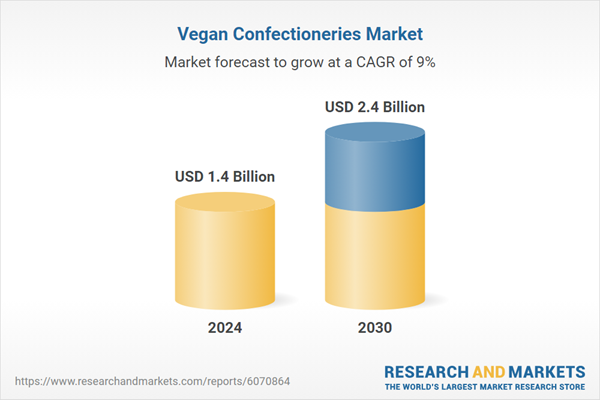Global Vegan Confectioneries Market - Key Trends & Drivers Summarized
What's Fueling the Sweet Shift Toward Plant-Based Indulgence?
The vegan confectionery market is witnessing a dynamic transformation as consumer preferences move decisively toward ethical, health-conscious, and plant-based eating habits. A growing demographic of vegans, vegetarians, and flexitarians is actively driving demand for dairy-free, gelatin-free, and cruelty-free sweet treats that align with personal values and evolving lifestyle choices. This shift is also fueled by increasing concerns over animal welfare, climate change, and sustainability, pushing more consumers to opt for plant-based alternatives even within traditionally indulgent categories. Vegan confectionery has transitioned from being a niche market into a mainstream offering, thanks to innovations in formulation and the growing availability of high-quality replacements for conventional ingredients such as milk, eggs, and honey. Natural sweeteners, coconut milk, nut butters, fruit purées, and plant-based emulsifiers are replacing their animal-derived counterparts without compromising taste or texture. As a result, vegan chocolates, gummies, toffees, hard candies, caramels, and baked treats are gaining traction not just among vegans but across broader health-conscious and ethically minded segments. This movement has been accelerated by increased media exposure, celebrity endorsements, and widespread availability across retail shelves, making vegan confectionery more accessible than ever before.How Is Innovation Driving the Future of Vegan Treats?
One of the defining features of the vegan confectionery market is the explosion of innovation in ingredients, production methods, and flavor profiles, which are reshaping consumer expectations around plant-based sweets. Brands are increasingly experimenting with new base materials such as oat milk, chickpea protein, rice syrup, and tapioca starch to enhance mouthfeel, structural integrity, and shelf life. Advances in food science have allowed manufacturers to create plant-based gelatin alternatives that replicate the chewy texture of traditional gummies, while innovations in cocoa butter and nut milk blends are revolutionizing the creaminess and melt-in-mouth experience of vegan chocolates. At the same time, the rise of functional confectionery is merging indulgence with health benefits, with products now infused with superfoods, adaptogens, vitamins, or probiotics to appeal to wellness-focused consumers. Flavor innovation has also accelerated, with vegan confectionery offerings expanding beyond basic fruit and chocolate to include global tastes such as matcha, tahini, cardamom, chili mango, and lavender. The focus on clean-label products - free from artificial colors, preservatives, and GMOs - is becoming a hallmark of premium vegan brands, creating opportunities for differentiation. These continuous advancements are not only making vegan confectionery more appealing and palatable but are also enabling scale, improving margins, and building strong consumer trust in plant-based indulgences.Why Are Retailers and Foodservice Players Betting Big on Vegan Confectionery?
Retailers and foodservice providers are playing an increasingly pivotal role in scaling vegan confectionery from boutique to mass-market appeal. Supermarkets, convenience stores, and specialty grocers are expanding their plant-based product portfolios, often giving vegan candy and chocolate dedicated shelf space to cater to growing demand. Private labels are launching competitively priced vegan lines, while established confectionery giants are introducing vegan versions of iconic products to stay relevant and inclusive. In parallel, bakeries, cafés, and dessert chains are expanding their menus to include vegan pastries, cookies, cakes, and seasonal offerings to attract a broader customer base. Quick-service restaurants and fast-casual brands are also entering the space by offering vegan dessert options as part of their menu innovation strategies. This retail and foodservice integration is further supported by packaging advancements such as compostable wraps, minimalist design, and clear vegan labeling, which reinforce the product's ethical and sustainable positioning. The rise of online grocery platforms and DTC channels has created additional visibility and accessibility for artisanal and niche vegan confectionery brands, helping them tap into new demographics and geographies. Social media trends, influencer marketing, and viral product launches are further amplifying consumer interest, creating a strong ecosystem where demand is being met with consistent innovation, convenience, and storytelling.What Forces Are Driving the Market's Rapid Expansion Worldwide?
The growth in the vegan confectionery market is driven by several factors directly related to technological progress, shifting consumption habits, end-use market expansion, and rising lifestyle alignment. First, the steady advancement in plant-based ingredient technologies - especially in texturizers, emulsifiers, and milk substitutes - has enabled more realistic and indulgent vegan treats that rival conventional products in flavor and performance. Secondly, evolving consumer behavior, particularly among Millennials and Gen Z, has accelerated the shift toward ethically produced, health-conscious, and climate-friendly foods, making vegan confectionery a lifestyle-driven category rather than a dietary compromise. The increasing use of vegan products in seasonal, festive, and gift-pack formats is expanding the application landscape beyond everyday snacking to celebratory consumption. Additionally, rising demand for allergen-free and digestive-friendly products - due to growing incidences of lactose intolerance and egg allergies - is pushing adoption among health-sensitive consumers. In foodservice and retail, operators are recognizing the incremental revenue potential of including vegan offerings, thus creating more sales channels for manufacturers. Furthermore, the global expansion of plant-based consumption, supported by regulatory encouragement and consumer education, is opening up new geographic markets, especially in Asia-Pacific and Latin America. These combined forces - technological feasibility, diverse end-use integration, evolving consumer values, and retail support - are establishing vegan confectionery as one of the most vibrant and high-growth segments in the plant-based food economy.Report Scope
The report analyzes the Vegan Confectioneries market, presented in terms of market value (US$). The analysis covers the key segments and geographic regions outlined below:- Segments: Product (Chocolate, Sugar, Flour); Distribution Channel (Offline, Online).
- Geographic Regions/Countries: World; United States; Canada; Japan; China; Europe (France; Germany; Italy; United Kingdom; Spain; Russia; and Rest of Europe); Asia-Pacific (Australia; India; South Korea; and Rest of Asia-Pacific); Latin America (Argentina; Brazil; Mexico; and Rest of Latin America); Middle East (Iran; Israel; Saudi Arabia; United Arab Emirates; and Rest of Middle East); and Africa.
Key Insights:
- Market Growth: Understand the significant growth trajectory of the Chocolate segment, which is expected to reach US$1.3 Billion by 2030 with a CAGR of a 8.4%. The Sugar segment is also set to grow at 10.1% CAGR over the analysis period.
- Regional Analysis: Gain insights into the U.S. market, valued at $392.7 Million in 2024, and China, forecasted to grow at an impressive 13.8% CAGR to reach $526.8 Million by 2030. Discover growth trends in other key regions, including Japan, Canada, Germany, and the Asia-Pacific.
Why You Should Buy This Report:
- Detailed Market Analysis: Access a thorough analysis of the Global Vegan Confectioneries Market, covering all major geographic regions and market segments.
- Competitive Insights: Get an overview of the competitive landscape, including the market presence of major players across different geographies.
- Future Trends and Drivers: Understand the key trends and drivers shaping the future of the Global Vegan Confectioneries Market.
- Actionable Insights: Benefit from actionable insights that can help you identify new revenue opportunities and make strategic business decisions.
Key Questions Answered:
- How is the Global Vegan Confectioneries Market expected to evolve by 2030?
- What are the main drivers and restraints affecting the market?
- Which market segments will grow the most over the forecast period?
- How will market shares for different regions and segments change by 2030?
- Who are the leading players in the market, and what are their prospects?
Report Features:
- Comprehensive Market Data: Independent analysis of annual sales and market forecasts in US$ Million from 2024 to 2030.
- In-Depth Regional Analysis: Detailed insights into key markets, including the U.S., China, Japan, Canada, Europe, Asia-Pacific, Latin America, Middle East, and Africa.
- Company Profiles: Coverage of players such as Andalou Naturals, Evonik Industries, Future Kind, Garden of Life, Geltor and more.
- Complimentary Updates: Receive free report updates for one year to keep you informed of the latest market developments.
Some of the 32 companies featured in this Vegan Confectioneries market report include:
- Alter Eco
- Cocomels
- Divine Chocolate
- Endangered Species Chocolate
- Enjoy Life Foods
- Go Max Go Foods
- Green & Black's
- Hu Chocolate
- Lagusta's Luscious
- Lindt & Sprüngli
- LoveRaw
- Moo Free
- No Whey! Foods
- NOMO
- Plamil Foods
- Ritter Sport
- Sjaak's Organic Chocolates
- Sweet Vegan
- Taza Chocolate
- Theo Chocolate
This edition integrates the latest global trade and economic shifts into comprehensive market analysis. Key updates include:
- Tariff and Trade Impact: Insights into global tariff negotiations across 180+ countries, with analysis of supply chain turbulence, sourcing disruptions, and geographic realignment. Special focus on 2025 as a pivotal year for trade tensions, including updated perspectives on the Trump-era tariffs.
- Adjusted Forecasts and Analytics: Revised global and regional market forecasts through 2030, incorporating tariff effects, economic uncertainty, and structural changes in globalization. Includes historical analysis from 2015 to 2023.
- Strategic Market Dynamics: Evaluation of revised market prospects, regional outlooks, and key economic indicators such as population and urbanization trends.
- Innovation & Technology Trends: Latest developments in product and process innovation, emerging technologies, and key industry drivers shaping the competitive landscape.
- Competitive Intelligence: Updated global market share estimates for 2025, competitive positioning of major players (Strong/Active/Niche/Trivial), and refined focus on leading global brands and core players.
- Expert Insight & Commentary: Strategic analysis from economists, trade experts, and domain specialists to contextualize market shifts and identify emerging opportunities.
Table of Contents
Companies Mentioned (Partial List)
A selection of companies mentioned in this report includes, but is not limited to:
- Alter Eco
- Cocomels
- Divine Chocolate
- Endangered Species Chocolate
- Enjoy Life Foods
- Go Max Go Foods
- Green & Black's
- Hu Chocolate
- Lagusta's Luscious
- Lindt & Sprüngli
- LoveRaw
- Moo Free
- No Whey! Foods
- NOMO
- Plamil Foods
- Ritter Sport
- Sjaak's Organic Chocolates
- Sweet Vegan
- Taza Chocolate
- Theo Chocolate
Table Information
| Report Attribute | Details |
|---|---|
| No. of Pages | 266 |
| Published | January 2026 |
| Forecast Period | 2024 - 2030 |
| Estimated Market Value ( USD | $ 1.4 Billion |
| Forecasted Market Value ( USD | $ 2.4 Billion |
| Compound Annual Growth Rate | 9.0% |
| Regions Covered | Global |









